Brief 32: Men Not Adequately Involved in Discussions About Prostate Cancer Screening

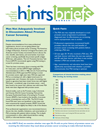
Despite recommendations from many professional organizations, doctors are not giving patients key information about prostate cancer screening. In this HINTS Brief, we examine whether men ages 50–74 with no prior history of prostate cancer are receiving the information they need about prostate cancer screening to make informed decisions.
September 2016
Brief 30: Cancer-related Information Seeking among Cancer Survivors

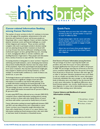
Cancer survivors may face physical, emotional, social, and financial challenges as a result of their diagnosis and treatment. Many people seek information from a variety of sources to cope with this “new normal.” In this HINTS Brief, we examine a decade of national trends in cancer-related information seeking among cancer survivors.
December 2015
Brief 29: Health Information Seeking on Behalf of Others: Characteristics of “Surrogate Seekers”

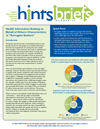
When it comes to searching for health information, there are “self seekers” – those who go online to find health information for themselves, and there are “surrogate seekers” – those who go online to look for information for others. People who engage in online health information seeking often fall into both categories. In this HINTS Brief, we identify unique demographic characteristics of surrogate seekers, and describe their satisfaction with the search process.
September 2015
Brief 28: Awareness of Electronic Cigarettes and Perceptions of Harmfulness

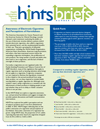
In 2012, HINTS began collecting data on the public’s awareness of e-cigarettes and perceptions of harmfulness. Since then, awareness of e-cigarettes has grown. Using HINTS data, the proportion of U.S. adults reporting they had never heard of e-cigarettes dropped from 22.3% in 2012 to 13.6% in 2013. In this HINTS Brief, we explore e-cigarette awareness, use, and perceived harmfulness and suggest strategies for provider-patient discussions and health communication interventions.
February 2015
Brief 27: Developing an Electronic Health Information System for High-Quality Cancer Care

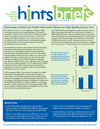
Hospital and health care providers’ adoption and use of electronic health record systems have grown dramatically since the Health Information Technology for Economic and Clinical Health was passed in 2009 to encourage the proliferation of these systems to enhance health communication and health care delivery. In this HINTS Brief, we describe the publics’ perceptions about the security and privacy of their electronic health information.
November 2014
Brief 26: Preventing Cancer through Increased Human Papillomavirus (HPV) Vaccine Uptake

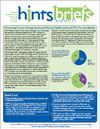
In this HINTS Brief, we discuss the HPV vaccine that became available in 2006, awareness of HPV has increased significantly, but remains lower than desired. In 2013, equal proportions (68 percent) of the general adult population reported having heard of HPV and the HPV vaccine. Prior to the vaccine’s release, only 38 percent of women were familiar with HPV, and awareness among all adults was likely lower.
May 2014
Brief 25: Picking up the Pace


Health information seeking and health communication have a significant effect on individuals’ health decisions, health-related behavior, and health outcomes. Data from HINTS have been critical in documenting and tracking these associations and trends in the U.S. population. To address emerging issues in the field of health communication more quickly while still maintaining the ongoing measurement of trends, HINTS 4 will include five data collection cycles over the course of 3 years. In this HINTS Brief, we discuss the HINTS 4 data collection cycles and the special topic modules that will field only in some cycles.
September 2013
Brief 24: Public Awareness of Direct-to-Consumer Genetic Tests

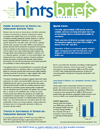
Many genetic tests are marketed directly to consumers through paid advertisements on television, radio, or the Internet. These direct-to-consumer genetic tests have become widely available, allowing consumers to purchase a range of genetic tests, often without the involvement of a health care professional. In this HINTS Brief, we explore national trends over time in public awareness of direct-to-consumer genetic tests.
May 2013
Brief 23: Health Information Technology and Meaningful Use

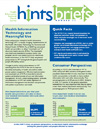
Policy and practice related to health information technology (HIT) is rapidly changing. Implementation of the Health Information Technology for Economic and Clinical Health (HITECH) Act of 2009 has stimulated health care providers to adopt “meaningful use” of electronic health records (EHRs). The meaningful use criteria are intended to increase health care provider use of—and patient access to—electronic health information. In this HINTS Brief, we present perspectives on HIT among both the general public and people affected by cancer.
February 2013
Brief 22: Trust and Use of Media for Health Information among U.S. Hispanics

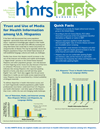
It has been well documented that some population segments—particularly those with lower socioeconomic status—experience knowledge gaps related to their health and their health care and often have difficulty accessing and using information that could help to reduce and prevent an unequal burden of disease. This may be especially relevant for Hispanic populations living in the United States because of well-established language, cultural, and media use challenges.
July 2012
Brief 20: Awareness of Clinical Trials and Attitudes About the Use of Personal Medical Information for Research

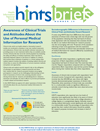
Clinical trials, which are health-related or biomedical research studies, are conducted to develop or test new medical treatments and medications. Clinical trials may benefit individual volunteers by providing access to new treatments before they are available outside of trials. Clinical trials also serve the overall population by evaluating the safety and efficacy of medical treatments, which may lead to improved treatment options in the future. In addition to research that involves direct treatment of patients in a clinical setting, other medical research involves the analysis of existing medical records and clinical data to assess the effectiveness of various treatment methods and patient care approaches.
October 2011
Brief 19: U.S. Social Media Use and Health Communication

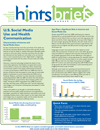
Surveys routinely find that more than two-thirds of U.S. adults use the Internet, and about 60 percent of those online say they use the Internet to look for health or medical information. Although studies continue to show that ethnic minorities and those who are older, less educated, and less healthy are more likely to be non-Internet users, a more nuanced picture of this “digital divide” is beginning to emerge, particularly with the advent of social media and mobile technologies.
August 2011
Brief 18: Implementation of HINTS in Puerto Rico

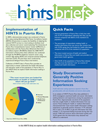
In 2009, a demonstration project was conducted in Puerto Rico using existing Behavioral Risk Factor Surveillance System (BRFSS) infrastructure to assess the feasibility of adapting the national HINTS survey to a local setting to facilitate local data collection and cancer control planning.
April 2011